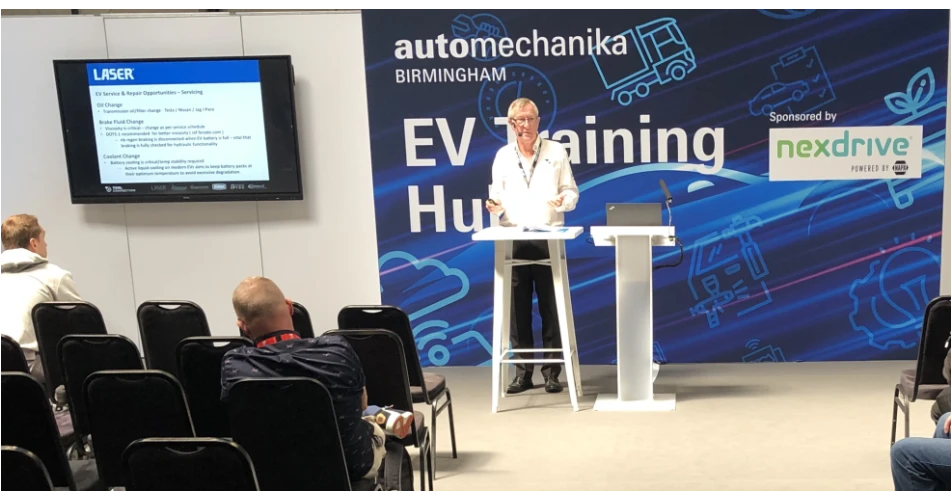There were many interesting and thought provoking presentations in the various training hubs at Automechanika Birmingham with a wide range of subject matter covered. Electric vehicles was a popular subject and David Mekie of Tool Connection gave a very enlightening talk on the Electric Future and opportunities for garages in the service and repair of EVs.
David in particular highlighted areas where EV require service and maintenance that differs from combustion engine vehicles because of the different technology. He pointed out that while EVs don’t need normal engine oil and filter changes, they do require oil and filter changes in the transmission system and this will be a growing area of business potential for workshop.
Other fluids also need attention on EVs. In particular brake fluids need to be checked and changed more regularly and will often require a fluid especially formulated for electric vehicle use. Similarly thermal management on EVs is a vital area as the batteries need to be kept cool. This often involves special battery coolant which also requires periodic changing to maintain performance.
Braking components was also an area identified by David as one that requires special attention. Because EVs use regenerative braking, the brake discs and pads are in use less frequently and this can lead to corrosion issues. In a combustion engine vehicle the heat in the brakes will dissolve moisture, but in EVs the brakes often do not heat up and so moisture stays on the components. This leads to discolouration, but can also cause more serious corrosion issues. David showed one example of an EV braking system, where both pads and discs were dangerously corroded after just 30,000 miles. For this reason EV brakes components need to checked regularly, cleaned and replaced more often.
EVs can also be prone to suspension issues, often due to the driving style of the driver. Many EVs have very swift acceleration, which drivers like to use. This places increased strain especially on components such as suspension arms. This, combined with increased vehicle weight can also cause increased tyre wear and a greater need for regular wheel alignment.
The evolution of EV batteries is also opening up new opportunities for the aftermarket. With early EVs batteries tend to be sealed units that could not be repaired. Newer EV batteries now tend to be modular, meaning that if damaged or faulty, individual modules can be replaced at a fraction of the cost of a complete replacement. This procedure of course requires the technician to have the appropriate training.
David also pointed out that areas such as; sensor replacement and climate control tend to need more attention on EVs and that garages can also generate business through EV charging. This could be in emergency charging, were a vehicle has lost power, or perhaps by offering a charging facilities on the premises.
David stressed that having the right tools, equipment and safety materials is vital for working on EVs and that in the Laser Tools range they offer everything from insulated screwdrivers, to EV battery lifts.
 David Mekie, Tool Connection, gave a very enlightening talk on the Electric Future and opportunities for garages in the service and repair of EVs
David Mekie, Tool Connection, gave a very enlightening talk on the Electric Future and opportunities for garages in the service and repair of EVs